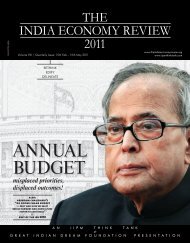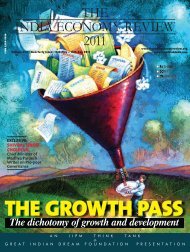Download - The India Economy Review
Download - The India Economy Review
Download - The India Economy Review
Create successful ePaper yourself
Turn your PDF publications into a flip-book with our unique Google optimized e-Paper software.
P LANNING P ARADIGM<br />
matic character amorphously favoured<br />
the English Rule. This was supported by<br />
the new benefi ciaries of permanent settle-<br />
ment and by the persons educated through<br />
British System.<br />
Amidst this ambivalent position <strong>India</strong>n<br />
political echelons adopted planned<br />
economy for its development. This exercise<br />
failed to recognise the multi-cultural<br />
ethnic and geographical variants of this<br />
country.<br />
Now Planning Commission of <strong>India</strong> is<br />
an institution of Government of <strong>India</strong>. Its<br />
responsibility is to make assessment of all<br />
resources of the country, to augment defi<br />
cient resources, to formulate plans for<br />
the most effective and balanced utilisation<br />
of country’s resources, to determine priorities<br />
etc. Pandit Jawaharlal Nehru was<br />
its fi rst Chairman as the Prime Minister of<br />
<strong>India</strong>. Since then the Prime Minister of<br />
<strong>India</strong> is the Chairman of the Planning<br />
Commission. <strong>The</strong> Planning Commission<br />
works under the overall guidance of National<br />
Development Council. <strong>The</strong> Deputy<br />
Chairman and the full time Members of<br />
the Commission as a composite body<br />
provide advice and guidance to Government<br />
for the formulation of Five Year<br />
Plans, Annual Plans, State Plans, Monitoring<br />
Plans Programmes, Projects and<br />
Schemes. <strong>The</strong> Planning Commission<br />
has its own in-house Resource Division<br />
and a dedicated structured<br />
set-up of qualifi ed professionals<br />
for each of the<br />
subject-specifi c divisions2<br />
.<br />
<strong>The</strong> Planning Commission<br />
was formed by an administrative<br />
order of Union<br />
Government in 1950 A.D.<br />
without any constitutional<br />
status3 . <strong>The</strong> responsibilities &<br />
82 THE IIPM THINK TANK<br />
terms of reference of Planning Commission<br />
at the centre are as follows: One, to<br />
make an assessment of the country’s productive<br />
resources. Two, to formulate a<br />
plan for the most effective and balanced<br />
utilisation of these resources. Three, to<br />
determine national priorities of development<br />
and defi ne the stages of growth and<br />
suggest allocation of resources. Four, to<br />
indicate factors tending to retard economic<br />
development and determine the<br />
conditions necessary for the successful<br />
execution of the plan. Five, to determine<br />
the nature of machinery required for implementation<br />
of each stage of the plan.<br />
Six, to appraise periodically the progress<br />
achieved in plan implementation; and,<br />
seven, to make recommendations for its<br />
own effective working.<br />
<strong>The</strong> operative procedure is ill-defi ned<br />
in the implementation of these objectives.<br />
<strong>The</strong> Planning Commission and the Planning<br />
Boards have not been<br />
provided with<br />
adequate infra-<br />
structure to work of its own. <strong>The</strong> Union<br />
Government and State Government was<br />
administrating the country in the manner<br />
of British rulers by the traditional administrators<br />
of line departments. In 1956,<br />
Panchayati Bill was passed in the Parliament.<br />
During Freedom movement a<br />
nebulous idea of Panchayati Raj was one<br />
of the foremost demands to establish<br />
people’s prerogative in the administration.<br />
Ironically Panchayat from its inception<br />
was deprived of any regulatory power<br />
over the traditional administration. Its<br />
relation with Planning Commission was<br />
ill-defi ned and ineffectively operative.<br />
To evaluate the effectivity of Panchayat<br />
System, Ashok Mehta Committee was set<br />
up in 19774 . It also failed to recommend<br />
regulatory power to Panchayat and Panchayat<br />
lost its prerogative to become an<br />
instrument of self-governance by the people.<br />
It became only another department<br />
of the Union and State Governments.<br />
<strong>The</strong> Planning commission was set up<br />
recruiting experts to advise the Union





